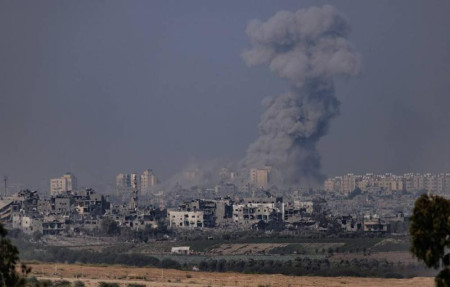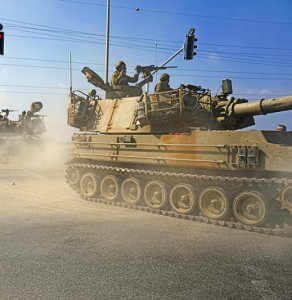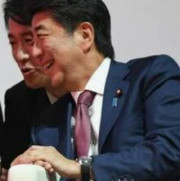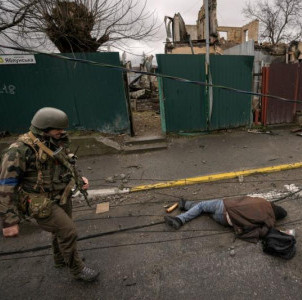
Israel and Hamas reach a ceasefire deal; NATO seeks to monitor vessels in neutral Baltic waters. Meanwhile, President Joe Biden rushes to remove Cuba from the US list of state sponsors ahead of Donald Trump’s arrival. These stories topped Thursday's newspaper headlines in Russia, according to TASS news agency.
Media: Israel-Hamas ceasefire deal finalized
On Thursday, Israel and the Palestinian radical movement Hamas reached a long-awaited ceasefire deal in the Gaza Strip, putting an end to the more than 15-month-long military conflict. The agreement, announced by Qatari Prime Minister Sheikh Mohammed bin Abdulrahman Al Thani, is set to take effect on January 19.
"The latest Gaza pact is stronger than the previous version proposed by the Biden administration, partly because [US President-elect Donald] Trump and his influence on the Israeli establishment played a significant role in securing it. Given that Israel will have to deal with the Trump administration in the coming years, quarrelling with the new US leadership would not be advantageous," Middle East analyst Leonid Tsukanov told Izvestia. According to him, both Israel and Palestine have developed a demand for ending the conflict, despite considerable dissatisfaction within factions of both elites over concessions on both sides.
At the initial stage, Hamas’ 33 prisoners in Gaza will be freed, including all women, children, and men above 50. Under a draft truce deal, Israel will release 1,000 Palestinian hostages who were not involved in the October 7, 2023 attack.
There remain 99 hostages in the enclave, including those believed to be dead, and there are two Russian citizens among the captives. Hamas earlier expressed its readiness to release them first as a gesture of respect toward Russia, if a deal is ever struck.
However, it is too early to say that the conflict has finally been resolved, as Israel has not achieved its goals in Gaza, nor has it completely defeated Hamas, Tsukanov argues.
According to experts at the US-based Institute for the Study of War (ISW), the IDF’s operational success in the Gaza Strip is misleading, as it conceals a lack of long-term strategy needed as long as Israel seeks to eradicate Hamas as a movement, Nezavisimaya Gazeta writes. The group’s field commanders will almost certainly start rebuilding their capabilities amid the truce, the ISW warns.
Delivering essentials to civilians in Gaza is a separate issue that will have to be addressed by the conflicting sides 16 days after the first stage of the ceasefire when they will launch discussions on how to implement the agreement effectively.
Izvestia: NATO seeks to inspect vessels in neutral Baltic waters
The Helsinki NATO summit adopted a number of resolutions that will affect shipping in the Baltic Sea. In particular, NATO announced the launch of a patrol operation there to protect the underwater infrastructure of coastal European countries. The alliance’s Secretary General Mark Rutte said that the Baltic Sentry mission would involve naval warships and warplanes. However, he did not specify which troops would take part in the operation.
NATO makes no secret of the fact that the measures are a response to Russia’s "shadow fleet," which purportedly poses a threat to the underwater infrastructure of the Baltic states. Finnish President Alexander Stubb said that the countries attending the meeting would build a team of legal experts to find ways of countering Russia’s hybrid influence in maritime areas.
Such measures against Russian vessels and ships sailing under the flag of countries engaged in Russian trade are being taken to harm Russia’s economy, military expert Vasily Dandykin told Izvestia. He criticized the initiative announced by Polish Prime Minister Donald Tusk as tantamount to terrorism and piracy.
NATO’s military and political leaders are clearly asserting their authority over existing international agreements, Vice Admiral Alexander Brazhnik, former First Deputy Commander of the Baltic Fleet, told the newspaper. There are distinctions between international and territorial sea waters, he explained, and any inspection of ships in international waters constitutes an act of violence. Such inspections could be seen as a violation of a state’s borders. "It would equate to an illegal invasion of Russia or another country," he emphasized. Should such actions occur, the Baltic Fleet will counter the threat to shipping, the admiral believes. According to him, such a response would require government authorization.
Individual countries in the region have long sought to control the neutral waters of the Baltic Sea, Baltic Studies Association President Nikolay Mezhevich confirmed to Izvestia, even though international law prohibits them from doing so. If NATO countries decide to patrol ships in the Baltic Sea, Russia will likely use a system of military convoys, he maintained. However, he sees little likelihood of the US triggering WWIII over actions by Estonia or Poland.
Media: US to remove Cuba from list of state sponsors of terrorism
US President Joe Biden has partially lifted restrictions on Cuba. He is set to remove the Latin American country from the US list of state sponsors of terrorism in a deal that he will soon notify Congress of, US media outlets reported, citing sources in the Biden administration. It is unclear how long these actions will last, as Donald Trump will be sworn in as the United States’ next president on January 20. He is known as a supporter of increasing pressure on Cuba, and the future Secretary of State, Marco Rubio, an ethnic Cuban and vocal critic of Communism, may persuade the president-elect to reverse Biden’s policy decisions regarding this country.
Almost immediately after Biden announced his decision, Cuba revealed preparations to release 553 prisoners in a deal brokered with the Vatican’s mediation. The list includes hundreds of Cubans formally considered political prisoners in the West, many of whom were arrested during the protests of July 2021.
"Actually, this is a return to the situation at the end of Obama’s presidency. But at that time, the lifting of sanctions under Obama was a real breakthrough in bilateral relations. Now, the question is whether Biden has coordinated his agreement with Trump. If not, Biden’s initiative will bring minimal benefits to the Cubans," Viktor Kheifets, director of the Center of Ibero-American Studies at St. Petersburg State University, told Nezavisimaya Gazeta.
For Biden, this move appears to be an attempt to end his presidency on a positive note, Marina Chernykh, a researcher at the Institute for US and Canadian Studies, told Vedomosti. She speculates that Trump may even escalate sanctions in the first months or even weeks of his presidency.
Irina Akimushkina from the Department of American Studies at Russian State Humanitarian University, or RGGU, agrees. According to the expert, while Cuba understands that Biden’s decisions may be short-lived, it initiated communication amid the ongoing humanitarian crisis.
Izvestia: Syria’s new officials make their first visit to Turkey
On January 15, a delegation from Syria’s transitional government paid the first official visit to Turkey as Syrian Foreign Minister Asaad Hassan al-Shaybani, Defense Minister Murhaf Abu Qasra, and intelligence chief Anas Hasan Khattab arrived in Ankara. The trip is yet another proof of a new chapter in relations between the two countries, given Ankara's prominent role in the Arab republic in the wake of the regime change in Damascus. The new Syrian leadership, which is a key beneficiary of recent developments, currently views Turkey as a strategic partner, Vladimir Akhmedov, a senior research fellow at the Center for the Study of Common Problems of the Contemporary East at the Institute of Oriental Studies of the Russian Academy of Sciences, noted in an interview with Izvestia. According to him, Turkish President Recep Tayyip Erdogan made no secret of his disappointment with how unyielding former Syrian leader Bashar Assad had been, and now Ankara has an opportunity to assert even more influence.
However, the Kurdish issue remains a persistent concern for Turkey, which has been seeking to resolve the issue militarily.
Given the transformed political landscape, Russia will have to negotiate with Turkey on the presence of its troops in Syria, as Ankara heavily influences decision-making in Damascus. Having become a key player in the Syrian arena, Ankara will dictate its rules of the game, and Russia will have to take this into account in deciding the future of its military bases. Russian Foreign Minister Sergey Lavrov said on Tuesday that Moscow had discussed Syria with Ankara.
Meanwhile, Mikhail Bogdanov, Russia’s special presidential envoy for the Middle East and Africa, emphasized that Russia is satisfied with constructive statements from the new Syrian administration regarding Russia and its interest in maintaining strategic bilateral relations.
And Ankara has already voiced its opposition to the presence of Russian military bases in Syria. Turkish Foreign Minister Hakan Fidan said his country disapproves of the maintenance of not only Russian but also other foreign military bases in the republic. However, he said, this issue is up to the Syrian people to decide.
Last year, Russian oil revenues alone amounted to 12.16 trillion rubles ($118.6 billion), an almost 30% increase from the previous year. This year, another record high is expected from oil producers. This may sound counterintuitive against the backdrop of statements about the shrinking share of oil and gas revenues in the budget. In 2025, oil and gas revenues are expected to reach a total of 10.9 trillion rubles ($106 billion).
Maxim Malkov, head of Kept’s services practice targeting oil and gas companies, told Rossiyskaya Gazeta that as long as market uncertainty persists, higher oil prices may partially or even significantly make up for the loss of budget revenues.
While the latest US sanctions on Russian oil will certainly have a negative effect on oil and gas revenues, it is unclear how soon Russian exporters will find a way out of the situation, given numerous oil tankers are currently away at sea and are not being received. It is clear to him that a way out will be found, but the question is when that will happen.
Yevgeniya Popova, project head at Implement, has a more conservative estimate of whether oil revenues will compensate for the shortfall of budget revenues as she said that will depend on Russian oil prices at the ports of Primorsk and Novorossiysk, and to a lesser extent - at the port of Kozmino and the ruble-dollar exchange rate.
TASS is not responsible for the material quoted in these press reviews









